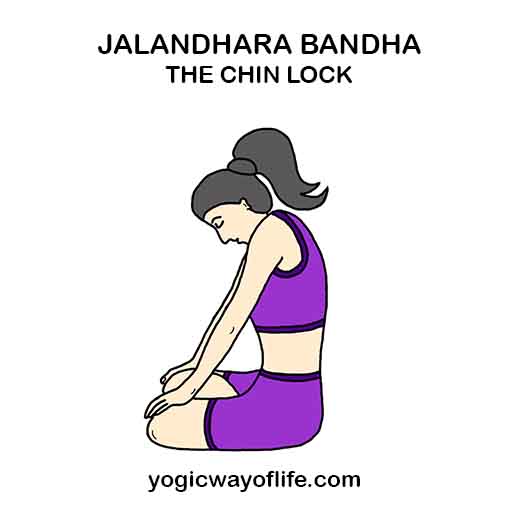Jalandhara Bandha or the Chin Lock is one of the three main Bandhas or locks practised by yogis. Jalandhara Bandha is described in the yogic texts Hatha Yoga Pradeepika, Gheranda Samhita and the Siva Samhita. Jalandhara Bandha is said to activate the Vishuddhi Chakra.
Jalandhara Bandha is practiced by bending the head forward and pressing the chin against the throat in the gap between the collar bones. It tones the thyroid and para thyroid glands and regulates the metabolism.

Jalandhara Bandha should be practiced after the practice of asanas and pranayama and before the practice of dhyana or meditation. In both the classical texts Gheranda Samhita and Hatha Yoga Pradeepika, Jalandhara Bandha is classified under the section on mudras or the psychic gestures. Even though Bandhas are technically not same as mudras, both are clubbed together as they induce a certain channelling of energy in the body which is conducive for higher practices of dhyana and Samadhi. Once it is mastered, it is done along with pranayama and mudras and before the practice of meditation.
How to do Jalandhara Bandha (The Chin Lock)?
- Assume the meditative pose like Padmasana or Siddhasana. Keep the spine straight.
- Place the palms on the knees and make sure that the knees are firmly touching the floor.
- Close your eyes and relax the body. Breathe normally.
- Now inhale slowly and deeply and then hold the breath.
- Contract the throat muscles and bend the head forward so that the chin touched the chest. Adjust the chin position so that it rests between the two collar bones in the pit of the throat.
- Straighten the arms and press the knees down with the palms to create a kind of locked position. The shoulders are slightly hunched forward to make sure the arms stay locked.
- Hold this position for as long as you are comfortable. Remember the breath is held inside. Do not strain or overdo the holding of breath. Beginners should hold the breath for just few seconds. Later it can be increased to a minute or more depending on your capacity. Experienced yogis however, can maintain the chin lock for three minutes or more.
- To release the lock bend the arms, raise your head and exhale out. Come back to the straight position and take few normal breaths.
- Repeat the process as many times as you feel comfortable.Once you have mastered the Jalandhara Bandha with breath held inside, you can experiment with the breath held outside. This requires a little practice and should be achieved slowly without straining. Hold the breath outside for just few seconds initially. Later you may increase it to minute depending on your capacity. Experienced practitioners can even hold the breath outside for two minutes or more. But this has to be done with caution. One should not feel any suffocation while holding the breath either inside or outside. Release the lock when you feel the slightest discomfort and breathe normally. The duration of the practice should be increased very gradually.Kumbhaka or holding of breath should not be practiced by those suffering from high blood pressure. Hence they should not do the practice of Jalandhara Bandha. Also, those suffering from cervical spondylitis and heart diseases should avoid Jalandhara Bandha. Stop the practice if dizziness or vertigo is felt.The Gheranda Samhita says that the Jalandhara Bandha can be perfected in a period of 6 months and that it gives psychic powers or siddhis to the practitioner.
Benefits of Jalandhara Bandha (The Chin Lock)
- The Jalandhara Bandha effectively closes the air passage and blocks the flow of air. This is used in the practice of Kumbhaka or holding of breath by yogic practitioners.
- Jalandhara Bandha presses against two important glands – the thyroid and the para thyroid glands. These two glands regulate the body metabolism.
- The throat region is the seat of the Vishuddhi Chakra. Jalandhara Bandha helps to activate the throat chakra. When activated, it is said to give immortality. The Gheranda Samhita says that Jalandhara Bandha gives victory over death. Here meaning of death is not the death of the body. Rather it means that the yogi can control the physical changes that happen in the body. It can mean that an anti-aging process is achieved by activation of the Vishuddhi Chakra. This is the meaning of immortality in this context. It is also said that a fluid called Amrita or nectar falls from a center in the brain called Bindu Visarga. This nectar falls through the throat and gets burned at the Manipuraka Chakra. Yogis use the Jalandhara Bandha to prevent the nectar from going down the throat, thereby attaining immortality.
- Jalandhara Bandha prevends the prana Shakti from moving upwards. When practiced with moola bandha, it can create a lock of the prana (upward moving energy) and apana (downward moving energy) in the body. The two energies mix and awakens the Navel Center or the Manipuraka Chakra.
- Jalandhara Bandha is one of the three yogic locks that have to be mastered before attempting the Maha Bandha or the triple lock.
